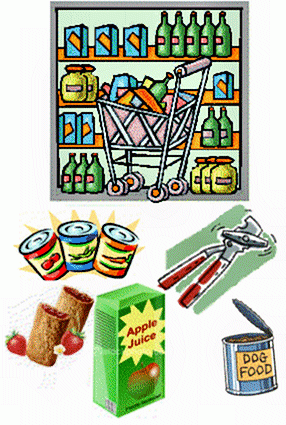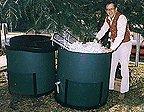Reduce Waste
Reduce/Reduction: to make something smaller or use less, resulting in a smaller amount of waste.
"Source reduction" is reducing waste before you purchase it, or by purchasing products that are not wasteful in their packaging or use.
A key part of waste "reduction" is "conservation"—using natural resources wisely, and using less than usual in order avoid waste.
You can practice reduction by selecting products that do not have to be added to landfills or the waste stream in general. This is really easy to do...
- First and foremost, buy and use less! If all the other people on the Earth used as much "stuff" as we do in the United States, there would need to be three to five times more space just to hold and sustain everybody.... WOW! So buy only what you need and use all of what you buy. Or make sure that when you are through with something, you pass it along to other people who can continue to put it to good use. This is especially important when it comes things that can be dangerous to our environment, such as paint and chemicals.
- Start making wise "package" selections. Why is it important to consider how something is packaged when you consider what to buy? You can reduce waste by selecting products that are not wasteful in their packaging. Flashy and fun packaging costs more, usually adds little or no value to the product, and (worst of all!) can do considerable harm to our environment by creating more waste or waste disposal difficulties. Keep the following package-related tips in mind no matter what you are buying:
- Precycle by purchasing products in materials/packaging that can be readily recycled. So whenever you have a choice, put plain and recyclable packages high on your list to reduce packaging waste in our environment.
- Avoid single-serve containers. You can buy juice or water in large recyclable bottles or cans and then divide it up in reusable, washable containers as you need it at home or to take with you. And if you want to take juice or water with you on your bike rides or to the gym, just take it along in your own reusable sports bottle.
- Before you buy bottled water, first find out if you really even need bottled water. City water (and clean well water) is usually just as healthy, much cheaper, and may even be safer than bottled water products.
- Refuse store bags! When you buy one or two items at a store, carry them out in your hands; or take a reusable bag with you to carry the items you buy. And don't forget to take your old plastic and paper bags back to the grocery store for reuse or recycling. Most grocery stores have convenient paper and plastic recycling bins located near the entrance.
Hints for parents
Think BIG! Buying in "bulk" (a large amount that is not divided into separate containers) gives you the best "product to package" ratio. Many stores allow shoppers to scoop out the amount they need of bulk goods like nuts or coffee. This considerably reduces waste and packaging materials. Or you can buy in bulk by selecting bigger quantities in a single box or package—for example, buy the largest box of toothpaste, dishwasher detergent, or cereal, rather than a series of small boxes. This not only reduces the waste (from having to throw out the old containers) but it will also save you money. Packaging is expensive, so buying in larger volumes reduces the unit cost.
Buy concentrates rather than diluted products—the result is less waste for disposal when it is empty.
Use durable goods longer. Durable goods are sturdy things like furniture or household appliances that can (and should) be used for many years. You can save money and reduce waste by keeping these items longer and repairing them when they break, rather than buying new ones.
Use durable items rather than disposable items whenever possible. For example, select reusable razors rather than the disposable one that you can only use a few times and then have to throw away.
Say NO to junk mail! Call toll-free numbers in unwanted catalogs and ask to be removed from mailing lists. Whenever possible, use the Internet to obtain (and pay) bills, news, catalogs, stock reports and other information that usually comes to your house in a paper format. Reducing paper reduces waste.
Start a garden. Food that you grow yourself does not have to be "processed" or "packaged", and no fossil fuels are needed to get it to the store and then to your house.
Start a compost or vermiculture bin to transform your household garbage (food wastes, coffee grounds, etc.), into a rich earth-like material that can be added to a garden to help plants grow. Grass, leaves, paper, and some other types of food can naturally decay and turn into compost, and that compost can then be put to good use in your garden. Replace lawns with mulched gardens that are just as pretty, but are better for our environment.





